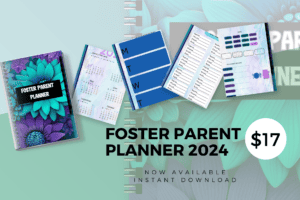Parenting, as we all know, is a journey filled with challenges, discoveries, and profound love. In my experience as a parent, child advocate, and teacher, I've encountered various parenting styles, each with its unique approach and philosophy. Today, I want to share with you a method that has resonated with me and many others in our community: the Love and Logic parenting approach.

Understanding Love and Logic Parenting
First, let's delve into what Love and Logic parenting truly means. Developed by Jim Fay and Foster W. Cline, M.D., this approach emphasizes respect and dignity for both children and adults. It encourages children to make choices and understand the natural consequences of their actions. The fundamental principle is simple yet profound: parents offer love and empathy while allowing children to solve their problems and live with the consequences.
Why Love and Logic Resonate with Me
As a foster parent, teacher, and advocate for children, I find the Love and Logic method particularly appealing for several reasons:
- Empowers Children: It teaches children to think for themselves and become more responsible.
- Fosters Decision-Making Skills: By allowing children to make choices, they learn valuable decision-making skills.
- Builds a Respectful Relationship: It encourages a respectful relationship between parents and children, devoid of power struggles.
- Adaptable and Flexible: It's versatile and can be adapted to suit different children and family dynamics.
Implementing Love and Logic in Daily Life
Offering Choices Within Limits
One of the key aspects of Love and Logic is offering children choices within set limits. For example, you might say, “Would you like to do your homework before dinner or after?” This gives them a sense of control while still adhering to your boundaries.
Allowing Natural Consequences
Letting children experience the natural consequences of their actions is another cornerstone. If a child forgets their lunch, instead of rushing it to school, you allow them to experience hunger. This might seem tough, but it teaches them the importance of responsibility.

Empathy and Understanding
Love and Logic also teach us to approach situations with empathy. When a child faces a consequence, respond with empathy and understanding, rather than anger or frustration. This approach fosters a nurturing environment where children feel loved and understood, even when they make mistakes. Here are seven ways to implement Love and Logic into your daily life.
1. Setting Enforceable Limits
One of the core principles of Love and Logic is setting limits that are enforceable. This means, that rather than issuing commands, you provide options that you can control. For instance, instead of saying, “Stop watching TV now,” you might say, “I will be happy to take you to your friend's house after the TV is off.” This puts the onus on the child to make a decision within the boundaries you've set.
2. Sharing Control through Choices
Offering choices is a powerful tool. The key is to provide options that are acceptable to you. For example, you can ask, “Do you want to wear the red shirt or the blue one?” instead of “What do you want to wear?” This strategy is particularly effective with younger children who seek some control over their lives but still need guidance.
3. Using Empathy before Delivering Consequences
Before enforcing a consequence, start with an empathetic response. If a child fails to complete their chores and loses some privilege as a result, you might begin with, “I feel sad that you chose not to do your chores and now can't use your tablet.” This empathetic approach ensures that the child understands that their choice led to the consequence, not your anger or disappointment.
4. Teaching Responsibility through Problem-Solving
Encourage your child to solve their problems. If they forget their homework, rather than rushing to bring it to them, ask them, “What do you think you can do about this situation?” This approach helps them understand the importance of responsibility and think creatively about solutions.
5. Providing a Strong and Loving Foundation
Love and Logic isn't just about discipline; it's also about providing a strong, loving foundation. Regularly spend quality time with your child, listen to their concerns, and show unconditional love and support. This balance ensures that when disciplinary actions are taken, they're seen in the context of a loving relationship.
To learn more about fostering, join me on Facebook!
6. Consistency is Key
Consistency in your approach helps your child understand what is expected of them. This doesn't mean being inflexible, but rather being consistent in your empathy, in offering choices, and in allowing natural consequences to occur.
7. Adjusting Strategies as Children Grow
The strategies used in Love and Logic should evolve as your child grows. Teenagers, for instance, will require different choices and consequences than younger children. It’s about adapting to their developmental stage and individual needs.
Incorporating Love and Logic into your daily parenting routine involves a blend of empathy, respect, and structure. It's about guiding children towards independence and responsibility in a loving way. By setting enforceable limits, offering choices within boundaries, showing empathy, and being consistent, we can raise children who are well-equipped to handle the challenges of life. Remember, every child and family is unique, and adapting these principles to fit your specific circumstances is crucial.
Challenges and Adaptations in Love and Logic Parenting
While Love and Logic offers many benefits, it's not without its challenges. Some children, especially those who have experienced trauma or have special needs, might require adaptations to this method. As a foster parent, I've learned that it's essential to be flexible and tailor your approach to each child's unique needs.
Delving deeper into the challenges and necessary adaptations of the Love and Logic parenting approach can provide a more realistic and tailored perspective, especially in diverse family dynamics.
Understanding Individual Differences
Every child is unique, with their personality, experiences, and needs. Some children may respond well to certain Love and Logic strategies, while others might not. Recognizing and respecting these differences is important, as is adapting the approach to suit each child. For example, a child with a strong-willed nature might require more options to feel in control, whereas a sensitive child might need more reassurance and emotional support.
Dealing with External Influences
Children are influenced by their peers, media, and other external factors. These influences can sometimes conflict with the values and norms you are trying to instill through Love and Logic. It’s crucial to maintain open communication, discussing these influences and guiding children to make choices that align with their values. To find a local support group
Addressing Special Needs
Children with special needs, such as those with ADHD, autism spectrum disorders, or emotional challenges, may require significant adaptations to the Love and Logic approach. These children might need more concrete examples, consistent routines, or tailored consequences aligning with their developmental and cognitive abilities.
Trauma-Informed Adaptations
For children who have experienced trauma, such as many foster children, a modified approach is often necessary. These children might need more predictability, reassurance, and a greater focus on building a secure attachment. Emotional regulation might be a significant focus, with a need for strategies that help the child feel safe and understood.
Balancing Empathy with Discipline
One of the most challenging aspects of Love and Logic is balancing empathy with discipline. It’s crucial to show empathy and understanding while still allowing natural consequences to teach valuable lessons. However, it's important not to let empathy turn into over-protection, which can hinder a child’s ability to learn from their mistakes.
Consistency Among Caregivers
Another challenge is ensuring consistency in the application of Love and Logic among all caregivers. Different parenting styles or approaches between caregivers can confuse children and reduce the effectiveness of the method. Clear communication and agreement on parenting strategies between all caregivers are essential.

Adapting to Age and Developmental Stages
As children grow, their needs, understanding, and responses change. The Love and Logic approach should evolve with the child’s development. What works for a preschooler may not be effective for a teenager. Continuously adapting your approach to match your child’s developmental stage is key to maintaining its effectiveness.
Implementing Love and Logic parenting is a dynamic process that requires patience, understanding, and flexibility. By recognizing and addressing each child's unique challenges and adapting the approach to meet these needs, parents can effectively use Love and Logic to build a strong, respectful, and loving relationship with their children. It's about finding the right balance and making adjustments as needed, always with the child's best interests at heart.
Personal Reflections and Experiences with Love and Logic
In my journey, I've found that Love and Logic has not only improved my relationship with my children but has also been a valuable tool in teaching. It fosters a sense of respect and understanding that is crucial in any learning environment.
Starting the Journey
My journey with Love and Logic began as an exploration to find a parenting style that resonated with my beliefs and values. As a parent and educator, I was searching for a method that promoted respect, responsibility, and a deep connection between parents and children. Discovering Love and Logic was a turning point.
Early Challenges
Initially, implementing Love and Logic was challenging. It required a shift in mindset from being a problem-solver for my children to being a guide who empowers them to solve their own problems. Learning to step back and allow natural consequences to occur was difficult but enlightening. I had to learn to control my urge to ‘rescue' my children from every difficult situation.
Observing Changes
Over time, I began to notice significant changes. My children started taking more responsibility for their actions and decisions. They were learning to think critically about the consequences of their choices. It was rewarding to see them grow into more independent and confident individuals.

Adapting to Each Child
One key realization was that Love and Logic needed to be adapted to each child's personality and needs. One of my children responded well to being given options, while another needed more guidance and reassurance. Understanding and respecting these differences was crucial in effectively applying the principles.
Implementing in Education
As a teacher, I adapted Love and Logic principles to my classroom management. It helped in creating a more respectful and cooperative learning environment. Students were encouraged to take responsibility for their learning and behavior, which fostered a more positive and engaged classroom atmosphere.
Learning from Failures
There were moments of failure and frustration as a parent and an educator. Not every situation was resolved smoothly, and sometimes, the outcomes were not as expected. These learning opportunities highlighted the importance of patience and the need to adapt my approach continually.
Building Stronger Relationships
Perhaps the most significant impact of Love and Logic has been on my relationships with my children. There's a deeper sense of mutual respect and understanding. We've learned to communicate more effectively, and there’s a strong foundation of trust and love.
Ongoing Journey
My journey with Love and Logic is ongoing. Parenting and teaching are dynamic roles that continuously evolve. However, my commitment to nurturing my children and students in a loving, respectful, and empowering environment remains constant.

My personal journey with Love and Logic has been transformative. It has influenced my parenting and teaching styles and contributed to my growth as an individual. The approach has its challenges, but the rewards of developing responsible, independent, and empathetic children are immeasurable. Sharing these experiences, I hope to inspire and encourage others in our community to explore and adapt this approach in their own parenting and educational journeys.
Love and Logic is more than a parenting style; it's a philosophy that promotes respect, responsibility, and resilience in children. It has transformed my approach to parenting and teaching, and I believe it can offer valuable insights to parents, especially those in the foster parenting community.
I'd love to hear your thoughts and experiences with Love and Logic parenting. Have you tried it? What challenges and successes have you encountered? Remember, each family is unique, and what works for one may not work for another. The key is finding what resonates with you and your children and approaching parenting with love, empathy, and a willingness to learn and adapt.
Resources
- Love and Logic Official Website: Love and Logic Institute, Inc.
- This official website provides comprehensive information about the Love and Logic approach, including books, articles, and training materials.
- Foster Care Support and Resources: Child Welfare Information Gateway
- This site offers many resources for foster parents, including tips and strategies for effective parenting and dealing with common challenges in foster care.
- Online Parenting Classes: Positive Parenting Solutions
- This website offers online parenting courses that can be beneficial for foster parents looking to enhance their skills.
- Foster Parent Community Support: FosterMomStrong
- Foster Mom Strong is a Facebook group for foster parents. It offers a community for support, sharing experiences, and accessing resources tailored for foster care challenges.
- Educational Resources for Children: Khan Academy
- As part of the Love and Logic approach involves supporting educational growth, Khan Academy is a valuable resource for foster parents to help children with their academic needs.
- Mental Health Resources for Children: Child Mind Institute
- The Child Mind Institute provides resources and information on children's mental health, which is crucial for foster parents dealing with children who may have experienced trauma or have special needs.
- Child Behavior Management Resources: Understood – For Learning and Thinking Differences
- This resource offers strategies and support for managing and understanding children's behavior, particularly those with learning and thinking differences.
- Healthy Living Tips for Families: MyPlate
- MyPlate can guide the whole family on nutrition and healthy eating habits, aligning with the holistic approach to foster parenting.
- Stress Management Resources for Parents: American Psychological Association – Managing Stress for a Healthy Family
- Foster parenting can be challenging and stressful at times. The American Psychological Association offers tips and resources for managing stress, which is crucial for maintaining a healthy and nurturing environment.
- Activities and Bonding Ideas for Families: Family Education – Activities
- Engaging in fun and bonding activities is important to building strong family relationships. This site offers creative ideas for foster parents to strengthen their bond with foster children.
- Support for Children with Special Needs: Parent Center Hub
- For foster parents caring for children with special needs, this resource provides specific information, support, and guidance to address their unique challenges.
- Foster Care and Adoption Stories: AdoptUSKids – Real Stories
- Reading real-life stories of foster care and adoption can be inspiring and informative for foster parents, providing insights and encouragement from those who have experienced similar journeys.
- Parenting Podcasts and Webinars: Parenting Beyond Discipline
- This site offers podcasts and webinars on various parenting topics, including discipline strategies that align with the Love and Logic philosophy, providing an alternative medium for learning and engagement.



